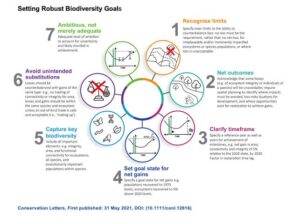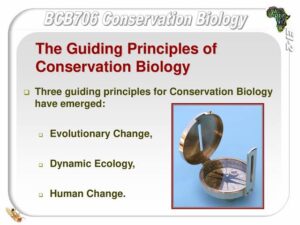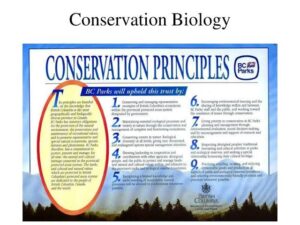Back to: Environmental Biology 300 Level
Welcome to class!
Hello brilliant mind! Have you ever seen a beautiful forest cleared overnight for housing or industries? Or perhaps heard about animals like the Cross River gorilla or African elephant becoming endangered? These are real issues affecting our environment and future. Conservation biology is all about protecting these treasures—our plants, animals, ecosystems, and natural resources—so they don’t disappear. In this lesson, we’ll explore what conservation biology means, why it matters for Nigeria, and how we can all play a part in protecting life on Earth.
Conservation Biology: Principles And Practice
What is Conservation Biology?
Conservation biology is the scientific study and practical effort to protect Earth’s biodiversity—this includes all living species, their habitats, and the ecosystems that support them. It is both a science and a mission: to prevent the extinction of species, maintain healthy ecosystems, and ensure natural resources are used sustainably.

Core Principles of Conservation Biology
Biodiversity is valuable and must be preserved: Every species, no matter how small, plays a role in the ecosystem.
Extinction should be prevented: Once a species is lost, it can never return. Preventing extinction is a core goal.
Ecological complexity matters: Healthy ecosystems are interdependent webs, and disruption to one part affects the whole.
Evolution must be respected: Species evolve over time, and conservation should support natural evolutionary processes.
Humans are part of the system: Conservation isn’t just about protecting nature from humans—it’s about finding ways for people and nature to thrive together.
Threats to Biodiversity in Nigeria
Deforestation from logging, agriculture, and urban expansion
Poaching and illegal wildlife trade, particularly for bushmeat and traditional medicine

Pollution from oil spills, mining, and industrial waste
Climate change, which affects rainfall patterns, habitats, and species survival
Invasive species that disrupt native ecosystems
Conservation Practices and Tools
Protected Areas: National parks, reserves, and community forests are key to protecting critical habitats. Nigeria has areas like Yankari Game Reserve and Cross River National Park.
Species Conservation Programmes: Special efforts to protect endangered species through breeding, habitat restoration, and monitoring. Example: Efforts to save the Cross River gorilla.
Environmental Education: Teaching communities, especially youths, about the importance of nature.
Sustainable Resource Use: Encouraging activities like regulated fishing, eco-tourism, and agroforestry to benefit both people and the environment.
Conservation Laws and Enforcement: Agencies like the Nigerian Conservation Foundation (NCF) and National Environmental Standards and Regulations Enforcement Agency (NESREA) help enforce laws to prevent illegal logging, hunting, and pollution.
Community Participation: Local people must be involved. Conservation works best when communities benefit directly—for example, through jobs in eco-tourism or harvesting non-timber forest products.
Success Stories in Nigeria
The Lekki Conservation Centre in Lagos is preserving swamp forests and educating the public.

The Nigerian Bird Atlas Project maps bird species across the country to support habitat conservation.
Local NGOs in Cross River and Taraba states have helped reduce poaching of chimpanzees and gorillas by training forest guards from local communities.
Summary
- Conservation biology focuses on protecting biodiversity and ecosystems for long-term sustainability.
- Key principles include preserving biodiversity, preventing extinction, and promoting human-nature balance.
- Threats in Nigeria include deforestation, poaching, pollution, and climate change.
- Tools for conservation include protected areas, species recovery programmes, education, and strong enforcement.
- Local success stories, like the Lekki Conservation Centre and Cross River gorilla projects, show conservation is working in Nigeria.
Evaluation
- Define conservation biology and explain its main purpose.
- List and explain any three principles of conservation biology.
- Mention four major threats to biodiversity in Nigeria.
- Describe three ways conservation is being practised in Nigeria today.
- Give an example of a successful conservation programme in Nigeria and explain its impact.
You’ve just unlocked a powerful part of environmental science—protecting life itself! By understanding conservation, you are not just learning—you are gaining the tools to help protect your country’s future. Keep learning and leading. Afrilearn is proud to support your journey to becoming a guardian of nature.
